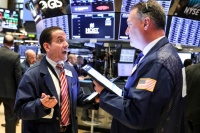Wall Street looks to earnings after strongest June in decades

By Caroline Valetkevitch
NEW YORK (Reuters) - On the heels of the S&P 500's best June performance in more than six decades, investors are anxious to see whether earnings can justify further gains as the largest U.S. companies open their books in the coming weeks.
The profit picture for 2019 has been weakening since the start of the year as the U.S.-China trade war has dragged on, increasing worries about its potential impact on corporate profit margins.
Analysts expect almost no profit growth for the second quarter in comparison with a year ago, versus a forecast of 6.5% growth at the start of the year. In addition, they expect a gain of just 0.7% in the third quarter, according to IBES data from Refinitiv.
The S&P 500 <.SPX> hit a record high on Monday after last week closing out June with a 6.9 percent monthly increase, its biggest June percentage gain since 1955.
The potential for a Federal Reserve interest rate cut this year largely propelled June's gains, while recent developments on the sidelines of the Group of 20 summit in Japan over the weekend offered fresh hope for investors that trade tensions may be easing.
With valuations rising, market watchers are paying close attention to the earnings forecast trend. The S&P 500 is now trading at about 17 times forward earnings, up from 16.3 at the start of the month, based on Refinitiv's data.
"We do have the Fed as a powerful force," said Kristina Hooper, chief global market strategist at Invesco in New York. "But a lot depends on external factors. We're already seeing downward revisions to the third quarter, and I don't think that's surprising.
"We know that economic policy uncertainty is created by the trade situation."
Companies also face tough earnings comparisons with last year, when tax cuts fueled a 24.9% profit gain in the second quarter.
Just as with the first quarter, both the second and third quarters could end up stronger than forecast, since the majority of companies typically beat analysts' expectations during a reporting period.
While S&P 500 companies may narrowly escape a profit recession this year - defined as two straight quarters of year-over-year declines - earnings for 2019 now are seen rising just 2.3%.
That would represent the lowest annual profit growth for S&P 500 companies since 2016, which included the tail end of a four-quarter profit decline and left earnings growth that year at just 1.4%, according to Refinitiv's data.
(For a graphic on 'Estimated Q2 S&P 500 profit growth' click https://tmsnrt.rs/2G0rf9J)
On Saturday, the United States and China agreed to restart trade talks. U.S. President Donald Trump had threatened to slap new levies on about $300 billion of additional Chinese goods, including popular consumer products, if the latest meeting proved unsuccessful. [
Tariffs on imports increase costs for U.S. companies, which then may need to raise prices on their goods.
Apple Inc (NASDAQ: AAPL), in comments posted on a government website, said last month that proposed U.S. tariffs on goods from China, including iPhones, iPads, and Macs, will reduce the company's contributions to the U.S. economy and hurt its global competitiveness.
Companies getting ready to report on the second quarter will no doubt warn about the potential impact of higher tariffs on their businesses, as they have done in recent earnings seasons.
Last week, FedEx Corp (NYSE: FDX) said the U.S.-China trade tensions would hurt its fiscal 2020 performance, along with the non-renewal of its contract with Amazon.com Inc (NASDAQ: AMZN).
Second-quarter reporting heats up in mid-July, with JPMorgan Chase (NYSE: JPM) due to report July 16.
To be sure, the prospect of lower interest rates is likely to soothe some of the worries, since lower rates in general reduce costs for companies.
But even with the recent trade news, strategists say uncertainty surrounding the trade discussions is likely to continue to weigh on outlooks.
"Our overarching conclusion is that the developments over the weekend on their own don't do enough to remove the uncertainty created by trade tensions, which began over a year ago and remain an overhang on corporate confidence and the macro outlook," Morgan Stanley strategists wrote in a note on Monday.
(Reporting by Caroline Valetkevitch; Editing by Alden Bentley and Dan Grebler)
